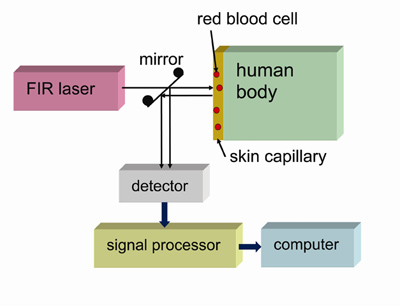 ME Associate Professor Wei Lu has been selected by the Bill Gates foundation to receive the Grand Challenges Explorations Grants. Through this grant, Lu proposes to explore the mechanism that red blood cells infected with malaria have significantly different characteristics when subjected to light in ultra-far infrared spectrum. Using these techniques, this project aims to develop a non-invasive tool to scan capillaries near the body surface and diagnose malaria.
ME Associate Professor Wei Lu has been selected by the Bill Gates foundation to receive the Grand Challenges Explorations Grants. Through this grant, Lu proposes to explore the mechanism that red blood cells infected with malaria have significantly different characteristics when subjected to light in ultra-far infrared spectrum. Using these techniques, this project aims to develop a non-invasive tool to scan capillaries near the body surface and diagnose malaria.
“Instead of detecting the spectrum of molecular vibrations, in the proposed research we focus on the body-level vibration spectrum at ultra-far infrared,” Lu said. The membrane vibration, twisting, body structure and surface waves provide a unique fingerprint of a cell, which can be used to identify different species or different cell states.
“Detecting the fingerprints of healthy and infected blood cells allows quick diagnosis of malaria,” Lu said.
“I am very excited about its potential to improve the health of people, especially in the developing world,” Lu said. The current invasive acquisition of blood samples usually comes at the price of high cost, patient annoyance, and significant training for health workers. The new approach and diagnostic tool offer quick screening and can be used widely in developing countries.
Grantees of this round were selected from almost 3,000 proposals world wide. All levels of scientists are represented, as are a wide range of disciplines, such as chemistry, bioengineering, electronics, mechanical engineering, infectious disease, and epidemiology. They are based at universities, research institutes, nonprofit organizations, and private companies around the world. Among them 76 proposals were awarded grants to support researchers in 16 countries.
